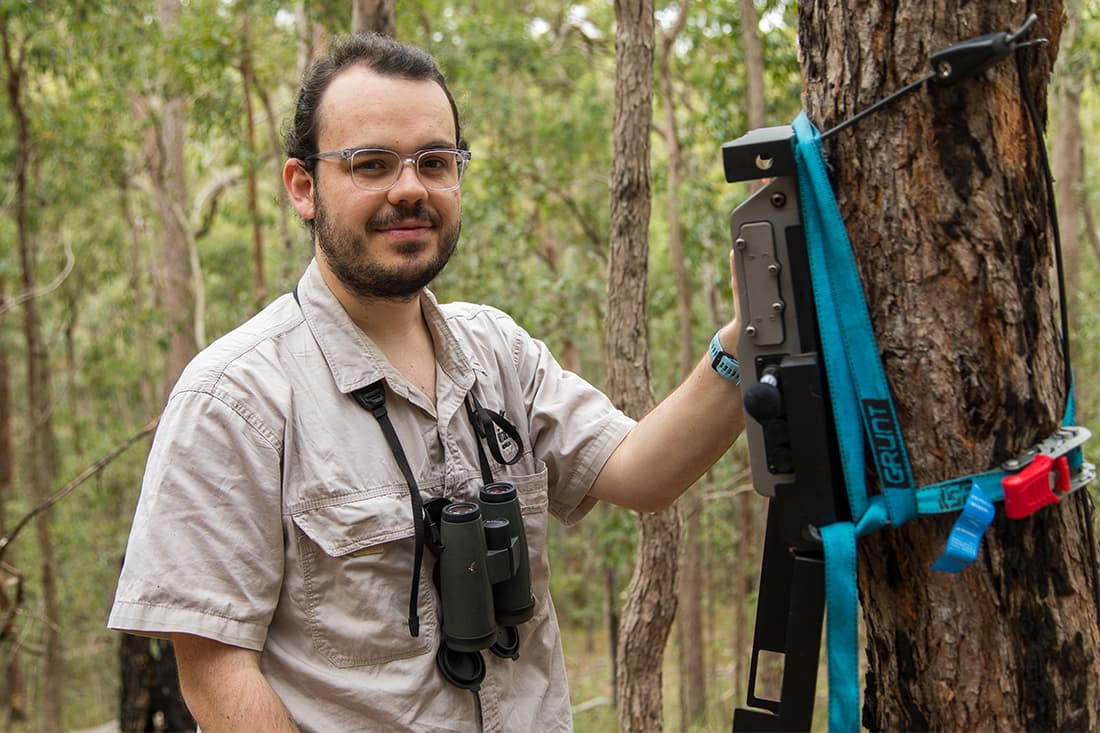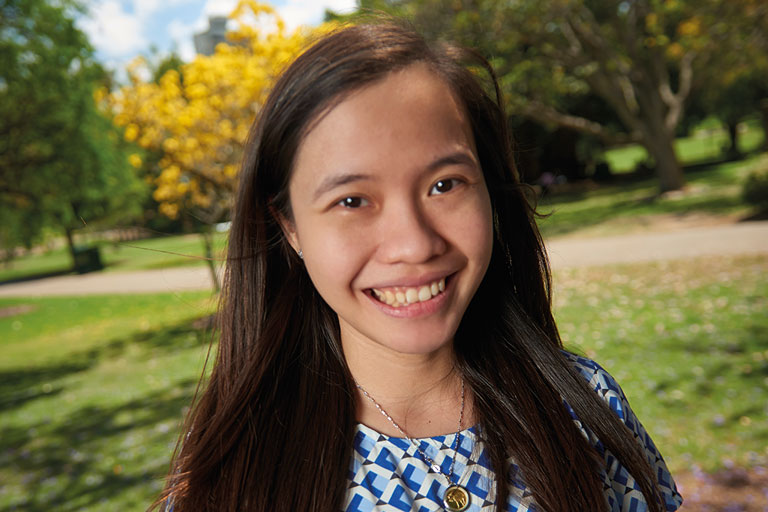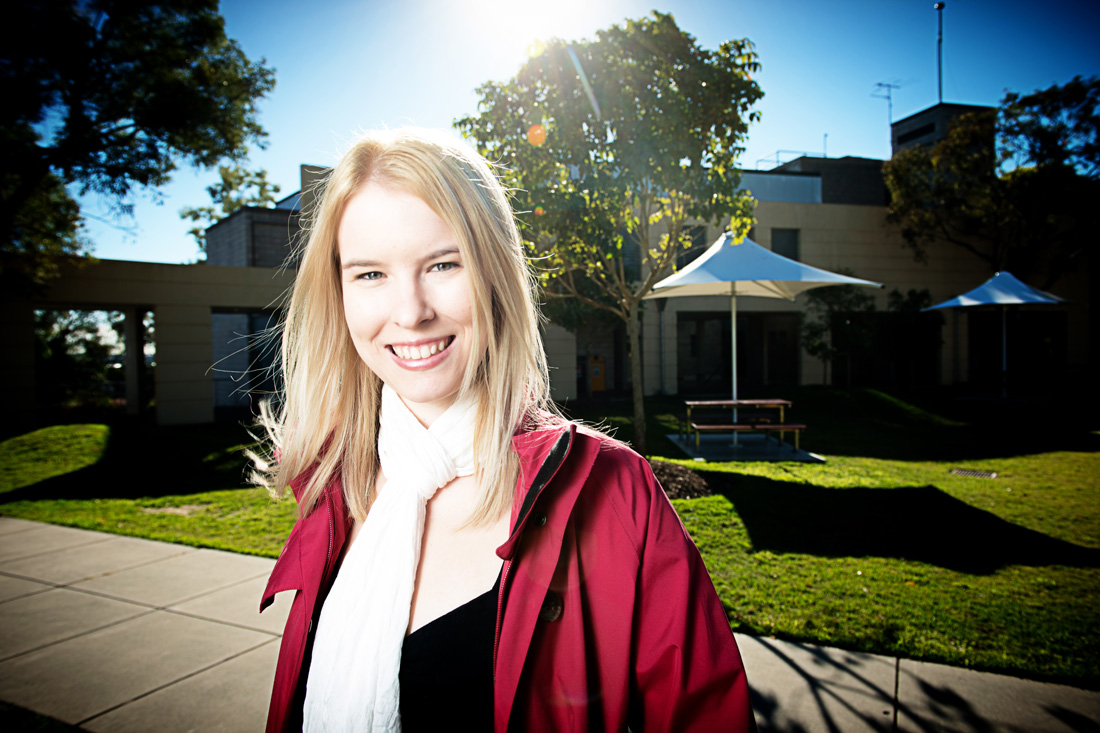Research degrees for good
See how Quandamooka woman Stephanie Parkin's Master of Philosophy research is helping her give back to her community.
Game-changing research
Master of Philosophy student Callan Alexander is working with BirdLife Australia to create an algorithm that can automatically monitor and track the threatened Australian powerful owl using acoustic monitors.
Funding your research degree
If you’re an outstanding graduate and aspiring researcher, you may be eligible to apply for a scholarship in one of our scholarship rounds.
Real-world degrees
‘After studying accounting in the Philippines, I chose to come to Australia to pursue a career that was more suited to my outgoing personality - marketing. I chose QUT because of its reputation for real-world degrees. When compared to my friends who are studying at other universities, I think the educational training provided by QUT is much more practical.’
Real graduate
'I have always had a passion for early childhood education and care. This research allowed me to investigate social and learning competencies in the early years for Australian children with special healthcare needs. QUT supported me in developing my research skills, and provided me with opportunities to meet other early childhood professionals.'
Research without fear
'Research on contentious issues such as carbon trading fraud, violence in mining communities and sex trafficking legislation would not occur without university centres providing the space for researchers to put their ideas forward without fear. Often such research is critical or government policies or industry initiatives but this research is also crucial to justice for the wider community.'
Research degrees for good
See how Quandamooka woman Stephanie Parkin's Master of Philosophy research is helping her give back to her community.
Game-changing research
Master of Philosophy student Callan Alexander is working with BirdLife Australia to create an algorithm that can automatically monitor and track the threatened Australian powerful owl using acoustic monitors.
Funding your research degree
If you’re an outstanding graduate and aspiring researcher, you may be eligible to apply for a scholarship in one of our scholarship rounds.
Real-world degrees
‘After studying accounting in the Philippines, I chose to come to Australia to pursue a career that was more suited to my outgoing personality - marketing. I chose QUT because of its reputation for real-world degrees. When compared to my friends who are studying at other universities, I think the educational training provided by QUT is much more practical.’
Real graduate
'I have always had a passion for early childhood education and care. This research allowed me to investigate social and learning competencies in the early years for Australian children with special healthcare needs. QUT supported me in developing my research skills, and provided me with opportunities to meet other early childhood professionals.'
Research without fear
'Research on contentious issues such as carbon trading fraud, violence in mining communities and sex trafficking legislation would not occur without university centres providing the space for researchers to put their ideas forward without fear. Often such research is critical or government policies or industry initiatives but this research is also crucial to justice for the wider community.'












Highlights
- Complete a university-wide degree that gives you access to expertise from all our faculties and research areas.
- Tailor your learning opportunities to your skills, experience and career goals. A research degree skills audit allows you and your supervisors to identify skills and align them with research and employment goals.
- Be exposed to transdisciplinary concepts and engage with other students across all disciplines with a cohort approach to learning.
- Engage with end users and acquire knowledge in areas that are seen as critical requirements to progress into the research workforce.
- Benefit from the support of experienced researchers who can guide and mentor your work and provide the best possible training foundation for future admission into a PhD.
Highlights
- Complete a university-wide degree that gives you access to expertise from all our faculties and research areas.
- Tailor your learning opportunities to your skills, experience and career goals. A research degree skills audit allows you and your supervisors to identify skills and align them with research and employment goals.
- Be exposed to transdisciplinary concepts and engage with other students across all disciplines with a cohort approach to learning.
- Engage with end users and acquire knowledge in areas that are seen as critical requirements to progress into the research workforce.
- Benefit from the support of experienced researchers who can guide and mentor your work and provide the best possible training foundation for future admission into a PhD.
Explore this course
A Master of Philosophy (MPhil) is a great option if you are interested in building your research skills while setting yourself up for the opportunity to advance to a PhD.
Our Master of Philosophy is personalised and innovatively designed to recognise the broad diversity of applicants' skills and background experiences, understanding each student has unique career aspirations.
Each of our faculties offers a Master of Philosophy, but if you're not sure what you'd like to specialise in there is also the option of a non-specialised degree.
Possible careers
- Academic
- Analytics consultant
- Consultant
- Corporate executive
- Editor
- Educational researcher
- Educator
- Higher education worker
- Legal risk manager
- Manager
- Ministerial policy adviser
- Professional writer
- Project manager
- Public relations officer/consultant
- Research assistant
- Research scientist
- Science researcher
- Scientist
Mandatory units
You'll need to complete:
- a time-based thesis
- IFN006 AIRS: Advanced Information Research Skills.
You may need to complete other units that are recommended by your faculty, negotiated with you and based on the skills gaps identified in your research degree skills audit.
Higher degree by research course regulations
Study areas
Your faculty may have several specialisations (study areas) that your research will align with. This will appear on your testamur at graduation:
Business and Law
- Master of Philosophy (Accountancy)
- Master of Philosophy (Advertising)
- Master of Philosophy (Economics)
- Master of Philosophy (Entrepreneurship and Innovation)
- Master of Philosophy (Finance)
- Master of Philosophy (Human Resource Management)
- Master of Philosophy (International Business)
- Master of Philosophy (Law)
- Master of Philosophy (Management)
- Master of Philosophy (Marketing)
- Master of Philosophy (Philanthropy and Nonprofit Studies)
- Master of Philosophy (Public Relations)
Creative Industries, Education and Social Justice
- Master of Philosophy (Design)
- Master of Philosophy (Communication)
- Master of Philosophy (Creative Practice)
- Master of Philosophy (Education)
- Master of Philosophy (Justice)
Engineering
- Master of Philosophy (Engineering)
- Master of Philosophy (Urban Development)
- Master of Philosophy (Biomedical Technology and Health)
Health
- Master of Philosophy (Biomedical Sciences)
- Master of Philosophy (Biomedical Technology and Health)
- Master of Philosophy (Exercise Sciences)
- Master of Philosophy (Materiobiology)
- Master of Philosophy (Medical Radiations)
- Master of Philosophy (Nursing)
- Master of Philosophy (Nutrition and Dietetics)
- Master of Philosophy (Optometry)
- Master of Philosophy (Paramedicine)
- Master of Philosophy (Pharmacy)
- Master of Philosophy (Physical Education)
- Master of Philosophy (Podiatry)
- Master of Philosophy (Public Health)
- Master of Philosophy (Psychology)
- Master of Philosophy (Social Work)
Science
- Master of Philosophy (Data Science)
- Master of Philosophy (Information Technology)
- Master of Philosophy (Magnetic Resonance in Medicine)
- Master of Philosophy (Mathematics)
- Master of Philosophy (Science)
- Master of Philosophy (Data Science)
Mandatory units
You'll need to complete:
- a time-based thesis
- IFN006 AIRS: Advanced Information Research Skills.
You may need to complete other units that are recommended by your faculty, negotiated with you and based on the skills gaps identified in your research degree skills audit.
Higher degree by research course regulations
Study areas
Your faculty may have several specialisations (study areas) that your research will align with. This will appear on your testamur at graduation:
Business and Law
- Master of Philosophy (Accountancy)
- Master of Philosophy (Advertising)
- Master of Philosophy (Economics)
- Master of Philosophy (Entrepreneurship and Innovation)
- Master of Philosophy (Finance)
- Master of Philosophy (Human Resource Management)
- Master of Philosophy (International Business)
- Master of Philosophy (Law)
- Master of Philosophy (Management)
- Master of Philosophy (Marketing)
- Master of Philosophy (Philanthropy and Nonprofit Studies)
- Master of Philosophy (Public Relations)
Creative Industries, Education and Social Justice
- Master of Philosophy (Design)
- Master of Philosophy (Communication)
- Master of Philosophy (Creative Practice)
- Master of Philosophy (Education)
- Master of Philosophy (Justice)
Engineering
- Master of Philosophy (Engineering)
- Master of Philosophy (Urban Development)
- Master of Philosophy (Biomedical Technology and Health)
Health
- Master of Philosophy (Biomedical Sciences)
- Master of Philosophy (Biomedical Technology and Health)
- Master of Philosophy (Exercise Sciences)
- Master of Philosophy (Materiobiology)
- Master of Philosophy (Medical Radiations)
- Master of Philosophy (Nursing)
- Master of Philosophy (Nutrition and Dietetics)
- Master of Philosophy (Optometry)
- Master of Philosophy (Paramedicine)
- Master of Philosophy (Pharmacy)
- Master of Philosophy (Physical Education)
- Master of Philosophy (Podiatry)
- Master of Philosophy (Public Health)
- Master of Philosophy (Psychology)
- Master of Philosophy (Social Work)
Science
- Master of Philosophy (Data Science)
- Master of Philosophy (Information Technology)
- Master of Philosophy (Magnetic Resonance in Medicine)
- Master of Philosophy (Mathematics)
- Master of Philosophy (Science)
- Master of Philosophy (Data Science)
- Course code
- IF80
- CRICOS code
- 095410G
-
- External
- Gardens Point
- Kelvin Grove
-
- Gardens Point
- Kelvin Grove
- 1.5 - 2 years full-time
- 4 years part-time
- This course is accredited as 2 years. However, it can be completed in 18 months - 2 years.
- 2 years full-time
- The CRICOS registered course duration is 2 years. However, this course may be completed full-time in 18 months to 2 years.
- Start any time
- Start any time
To be eligible for this course, you need either:
- a completed recognised bachelor honours degree in a discipline relevant to your intended area of study or
- a completed recognised bachelor degree or equivalent in a discipline relevant to your intended area of study with:
- a minimum grade point average (GPA) score of 5.00 (on QUT's 7 point scale)
- relevant professional and/or research experience (as determined by the faculty).
Applications and proposed research projects are subject to supervisor availability and resources available within the faculty.
Minimum academic requirements
To be eligible for this course, you need either:
- a completed recognised bachelor honours degree in a discipline relevant to your intended area of study or
- a completed recognised bachelor degree or equivalent in a discipline relevant to your intended area of study with:
- a minimum grade point average (GPA) score of 5.00 (on QUT's 7 point scale)
- relevant professional and/or research experience (as determined by the faculty).
Applications and proposed research projects are subject to supervisor availability and resources available within the faculty.
Minimum English language requirements
Select the country where you completed your studies to see a guide on meeting QUT’s English language requirements.
Your scores and prior qualifications in English-speaking countries are considered. Approved English-speaking countries are Australia, Canada, England, Ireland, New Zealand, Scotland, United States of America and Wales.
If your country or qualification is not listed, you can still apply for this course and we will assess your eligibility.
We accept English language proficiency scores from the following tests. Tests must be taken no more than 2 years prior to the QUT course commencement.
| English Test | Overall | Listening | Reading | Writing | Speaking |
|---|---|---|---|---|---|
| PTE Academic/PTE Academic Online | 58 | 50 | 50 | 50 | 50 |
|
Cambridge English Score
You must share your results with QUT through the Candidate Results Online website. |
176 | 169 | 169 | 169 | 169 |
| IELTS Academic / IELTS Online / IELTS One Skills Retake | 6.5 | 6 | 6 | 6 | 6 |
| TOEFL iBT / Home / Paper | 79 | 16 | 16 | 21 | 18 |
Don't have the English language score you need? We can help!
We offer English language programs to improve your English and help you gain entry to this course.
When you apply for this course, we will recommend which English course you should enrol in.
Your actual fees may vary depending on which units you choose. We review fees annually, and they may be subject to increases.
2025 fees
2025: Available from July
2025 fees
2025: Available from July
2024 fees
2024: $31,000 - $39,000 per year full-time if you exceed the maximum time under RTP
2024 fees
2024: $33,000 - $40,000 per year full-time.
If you're an Australian citizen or permanent visa holder, or a New Zealand citizen, your tuition fees are normally covered by the Australian Government Research Training Program (RTP) Fees Offset (Domestic), as long as you complete your degree within the program's set timeframes. You'll have to pay tuition fees if you exceed the time limits under the RTP.
FEE-HELP: loans to help you pay for your course fees
You may not have to pay anything upfront if you're eligible for a FEE-HELP loan.
You can apply for scholarships to help you with study and living costs.
Keep up to date
QUT courses for you
Like to save your courses?
Please enter your first name and email so we can save your courses for you